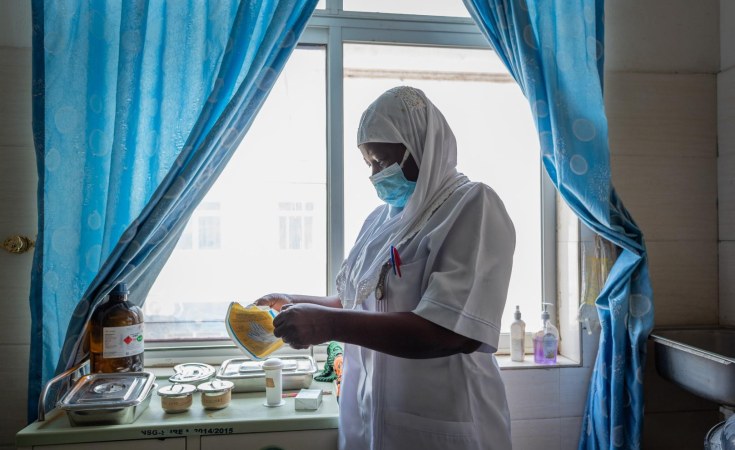Harare, Zimbabwe — The country's screening initiatives help women detect cervical and breast cancers early -- but what happens next?
In 2018, Pelagia Chikwera, a soft-spoken mother of three, attended a free cervical cancer screening at a hospital in Harare. "There was an advertisement about a free cancer screening, and I decided to go since it was free," she says. "Little did I know that the results would come back positive."
She was diagnosed with stage 2B cervical cancer, which means the cancer had already spread from the cervix to the tissue around the uterus. But she wasn't offered treatment. Her battle with the disease continues to this day.
In the past several years, Zimbabwe has launched various initiatives to screen women for cervical and breast cancer, but these efforts rarely include treatment options. Public hospital treatment facilities are scarce -- only two hospitals in the country offer radiotherapy -- and they're often in disrepair or lack staff. Meanwhile, private care remains out of reach for most women.
Since 2010, the United Nations Population Fund, the body's agency for sexual and reproductive health, supported the Ministry of Health and Child Care as it piloted cervical cancer screening centers in clinics and hospitals across the country. As of 2018, 103 such centers had opened.
In 2017, the most recent year for which data is available, a separate program by the United States President's Emergency Plan for AIDS Relief, a 110 billion-dollar US government initiative to address AIDS worldwide, screened 100,000 women for cervical cancer in Zimbabwe. Of those who received a positive diagnosis, only 57% received treatment, falling short of the program's 80% target for that year.
The government claims the numbers are improving. In May 2023, the then minister of Health and Child Care and Vice President Constantino Chiwenga stated in Parliament that 88% of the 255,577 women who received a positive diagnosis for cervical cancer the previous year had received treatment. Global Press Journal was not able to independently verify those numbers. The Ministry of Health and Child Care did not respond to a request for comment.
Meanwhile, first lady Auxillia Mnangagwa has been at the forefront of an ongoing cervical cancer awareness campaign. She has traveled around the country with a mobile clinic to encourage women to get screened.
According to 2018 data from the World Health Organization, breast and cervical cancers are the top-killing cancers in Zimbabwe. Of 12,217 cancer deaths that year, 7.3% were from breast cancer and 17.6% were from cervical cancer. Zimbabwe's HIV prevalence also leads to higher mortality rates, as AIDS compromises the immune system, making it more likely for certain cancers to emerge.
For Chikwera, the diagnosis brought despair. "I didn't know where to go. I didn't have money for treatment," she says. At the time, doctors and nurses were on strike -- a frequent occurrence in Zimbabwe -- and the few oncologists who were working were handling serious cases. Since her cancer was at stage 2, she was not prioritized for treatment.
Edinah Masiiwa, the executive director of Women Action Group, a nonprofit, praises the government's efforts to expand screening, but says subsequent treatment options have fallen short.
"Screening does not always lead to treatment," she says. "However, it's very important to get screened early, even when the results come back positive. The cost of treatment is reduced significantly if the disease is detected early."
According to the WHO, early cancer detection enables treatment that is more effective, less complex, requires less resources and is often localized in one area, making it easier to treat. In its more advanced stages, the cancer is likely to have spread to other body parts, requiring extensive surgeries and prolonged chemotherapy.
Lovemore Makurirofa, the monitoring and evaluation coordinator at the Cancer Association of Zimbabwe, agrees that there isn't sufficient support for treatment. "The treatment gap keeps on widening because of the unavailability of radiotherapy and the high cost of chemotherapy and other forms of cancer management."
Makurirofa says the country needs a more sustainable fundraising mechanism to support free or subsidized cancer treatment.
"We have noted that once a family member develops cancer, they are likely to sell everything that they have in order to access treatment," he says.
This was the case for Chikwera. After her positive diagnosis, she had to pay for her own exams. "There was a lot of money that was required, and I had no idea where to get it," she says. "I got a lot of assistance from relatives, and until today, I still require money to undergo treatment."
Claire Webster, who had a double mastectomy after a breast cancer diagnosis, spent her life savings to survive.
"My journey with cancer was that, from the moment that I saw the bruise until I was told I was in remission, there was no good news. It just went from bad to worse to worse to worse," she says. "However, we caught it incredibly early, which is why I'm here to tell my story."
Webster had eight rounds of chemotherapy and surgery, incurring a total cost of more than 50,000 US dollars, which she was only able to cover because she had reliable medical insurance. She had to undergo part of her treatment in South Africa, since some services, such as radiotherapy, were not available in Zimbabwe.
Meanwhile, Chikwera's journey continues. Her cervical cancer has spread to her lungs. She is still working to raise money for treatment.
"All I have is hope," she says. "I believe God still wants me to live."
Linda Mujuru is a Global Press Journal reporter based in Harare, Zimbabwe.


